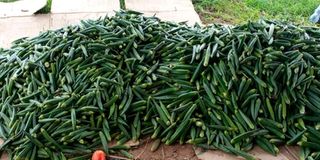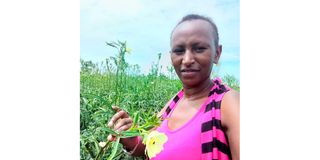Premium
Why waitress is not planning to turn her back on okra

Part of Joyce Njoki’s okra harvest. She gets up to 400 kilogrammes in one harvest.
Joyce Njoki was busy inspecting crops at her five-acre farm in Mandunguni, Kilifi County, when the Seeds of Gold team arrived.
The 38-year-old mother of two was elated to share her journey from waiting at tables, a hospitality investor to farming.
Farming was her Plan B after investments in tourism and hospitality went down the drain due to the coronavirus pandemic.
Judging by Njoki’s smile, farming could be the best decision she has ever made.
“We started by growing tomatoes in 2021. The first crop did well but the second was destroyed by pests. The losses taught us a lot,” she says.
Apart from the farm, Njoki and her husband have leased a six-acre piece for Sh5,000 an acre annually.
The couple planted a variety of crops, including sukuma wiki, cabbages, maize and spinach.
Despite being in demand, vegetable farming appeared not sustainable.
They went back to the drawing board and came across okra, locally known as mabenda.
Okra production
Njoki and her husband’s farming took a turn for the better with okra production.
“We were looking for something that could help maintain the farm. It is probably the best crop to grow as it reaches maturity fast,” she says.
Okra is a flowering plant that was originally grown in India. It found its way to a number of English-speaking countries.
It is commonly known as lady’s fingers, gumbo, bhamia, bhindi and bhendi in various communities.
“The seed takes 12 days to germinate and starts flowering 40 to 50 days later,” she says.
Okra pods mature three days from the flowering time. That is the time they need to be harvested.
“One plant can produce 25 to 30 pods,” Njoki says.
For a good harvest, okra plants need adequate water, fertiliser and pesticides.
“Okra performs well in deep soil that is rich in organic matter. It thrives in loam sandy soil with a pH of 5.8. With all the crop requirements, an acre can produce 90 to 100 kilogrammes of pods,” she says.

Joyce Njoki.
“I have four acres under okra. That means I get around 400 kilos per harvest. A kilo of okra goes for Sh25 to Sh40, depending on the market.”
She sells her okra in bulk at Kongowea Market in Mombasa.
Locals who need okra for consumption can get it directly from Njoki’s farm.
Being near River Galana has boosted her farming venture as there is enough water for irrigation.
With irrigation, Njoki and her husband can harvest their okra all year round.
“We use well water. Fortunately, one doesn’t not need to dig deep to reach the water. We have two wells because of the size of our farm,” she says.
As with any other enterprise, okra production, especially on a large scale, comes with challenges – considering it is a perishable crop.
“We suffered losses during the festivities in 2021. Kongowea market and others closed for days because people had travelled to their rural homes,” Njoki says.
“Okra can only last for three days. It cannot be eaten after that as it hardens.”
If the pods are not harvested on the fourth day after maturity, the plant withers and dies.
“I had slashed plants on two acres as they were full of spoiled okras,” she says.
According to George Kamami, an expert in horticulture and land use, okra blossoms in areas with black volcanic soil, warm temperature and a reliable constant supply of water.
Kamami, who is also head of the World Food Programme-funded project on promoting sustainable food systems, says farmers need to adopt modern technology to minimise losses.
He says machines like rippers are important when it comes to land preparation.
Kamami adds that drip irrigation helps minimise water wastage and conflicts over the resource.
Before venturing into farming, Njoki had lived in Diani and Malindi for almost a decade.
She joined the National Youth Service (NYS) in 2004 but never thought the farming courses would improve her life years later.
Basic training
“I had six months of basic training at NYS in Gilgil before spending the next two years at Naivasha Technical Training Institute. We planted cabbage, potatoes and coriander,” she says.
According to Njoki, the courses and the nation-building programme at the NYS were unnecessarily long. She quit to try other things.
“I decided to take a course that would not last years so I joined the NYS Driving School in Nairobi and got a licence,” she says.
Njoki then went into hospitality and was hired as a waitress.
“I left work upon marriage in 2012. We stayed in Diani for seven years as my husband was also in tourism. We shifted to Malindi in December 2017,” she says.
Tourism sector bore the brunt of Covid-19 pandemic in 2020 and 2021.
Njoki knew her goose was already cooked. It was not time to set in motion her Plan B. And it has worked





